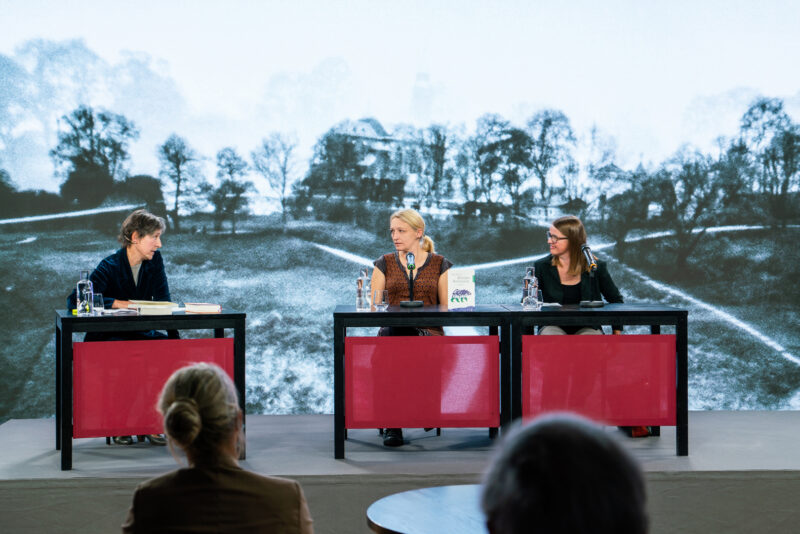LITHUANIAN WRITERS PRESENTED FOR THE FIRST TIME AT THE MUNICH LITERATURE MECCA

Lithuanian literature night. Photo by Katarina Sopcic
On 23 September, The Munich House of Literature (Literaturhaus München) hosted the premiere of Lithuanian literature: in the hall where Margaret Atwood, Salman Rushdie, Orhan Pamuk and other legends of the literary world presented their works, excerpts from Antanas Škėma’s, Rasa Aškinytė’s and Rimantas Kmita’s books were read. They revealed not only the unique worldview of the Lithuanian authors but also the historical and cultural background of different epochs.
Although there are still no Lithuanian authors on the interior walls of Literaturhaus München, decorated with the names of many writers who previously read there, the entrance to the main hall is faithfully guarded by a brown bear, a symbol of the family of Nobel Prize winner Thomas Mann who had close links with Lithuania. This stuffed animal kept moving together with the Mann family to all their homes, “lived” in Munich for almost four decades and now welcomes guests to the House of Literature. The organisation, which has been holding readings not only by literary stars but also by promising young writers, as well as various educational and publishing projects, has been operating since 1997. The Munich House of Literature is located in Salvator Square, the former building of Munich’s first girls’ gymnasium.
From the 2nd century AD Aisčiai Baltic tribe to the 1990s Šiauliai
Before inviting Lithuanian writers on stage, Elke Schmitter, the cultural editor of the weekly Der Spiegel, writer and poet who moderated the evening, introduced Lithuania to the large audience that had gathered that evening as a country of complex history and high culture in the centre of Europe and expressed her deep affection for it. In 2017, she participated in a journalists’ visit to Lithuania organised by the Lithuanian Culture Institute before the exclusive presentation of Lithuania at the Leipzig Book Fair and wrote articles on Lithuanian literature and culture.
The moderator’s conversation with Rasa Aškinyte revolved around the fact that people’s experiences in the 2nd century AD she writes about in her novel Glesum (translator into German Markus Roduner and the publisher Mitteldeutscher Verlag present it to German readers under the title Kleines Bernstein) are not much different from those of modern people. Rimantas Kmita provided many arguments to support his claim that the mere three decades that separate us from the “turbulent 90s” depicted in his novel The Southern Chronicle (by the same translator and publisher) marked significant social, cultural, political and other changes. “After all, at least in our apartment, there was no telephone at that time,” the author noted.
In the symbolic timeline – from the Aisčiai Baltic tribe of the 2nd century AD to the beginning of Lithuania’s Independence in Šiauliai – Antanas Škėma’s work was presented as a testament to one of the most painful historical breaking points of the 20th century. According to Schmitter, the works of this writer, who since the publishing of the German translation of his iconic book The White Shroud in 2017 has become known in Germany as the “Lithuanian Camus”, are a fusion of authentic talent, existentialism and expressionism.
Excerpts from the latest German edition of Škėma’s Apocalyptic Variations (Apokalyptische Variationen), translated by Claudia Sinnig, the translator of The White Shroud, and published by Guggolz Verlag, were read by actor Michael Kranz. He also read an excerpt from Rimantas Kmita’s novel The Southern Chronicle, while an excerpt from Rasa Aškinytė’s book was read by actress Sabrina Khalil. Translator Saskia Drude helped the writers, moderator and audience understand each other.
“A country with a population of just three million has surprisingly a lot of good jazz!” the moderator noticed, introducing musicians Karolis Šarkas and Mindaugas Stumbras at the beginning of the evening. Their jazz improvisations provided, in the words of Schmitter, “a somewhat melancholic background to somewhat melancholic Lithuanian literature”.
Lithuanian cultural events in Bavaria will continue throughout autumn
On 24 September, Karolis Šarkus, Mindaugas Stumbras and other musicians of the band Brave Noises will open the Lithuanian jazz weekend at the legendary jazz club Unterfahrt. Brave Noises will be followed by Viktorija Gečytė with her band and Dmitrijus Golovanovas.
An exhibition of the painter Patricija Jurkšaitytė will be opened at the Neue Galerie im Höhmannhaus in Augsburg in October, and an evening of contemporary Lithuanian poetry with Aušra Kaziliūnaitė, Giedrė Kazlauskaitė, Marius Burokas and Tomas Venclova will take place at the Munich poetry library Lyrik Kabinett. Arturas Bumšteinas will present his new piece at the media art festival LAB30 in Augsburg. The Nuremberg Pop Festival will feature live streams of performances by the Lithuanian bands shishi, Afrodelic, Timid Kooky and Junior A. The programme of the Lithuanian cultural season in Bavaria also includes the residence of playwright Birutė Kapustinskaitė at the Residenz Theatre in Munich.
In November, the final events of the Lithuanian cultural season will take place for three days at the Blaibach Concert Hall. The contemporary music ensemble Synaesthesis, which has won the prestigious Bavarian Prize, the special Ernst von Siemens ensemble prize, will perform the Lithuanian composer Žibuoklė Martinaitytė’s piece The Hadal Zone, which the composer was writing while residing in Blaibach this summer.
In the lobby of the Blaibach Concert Hall, the exhibition Ancient Woods by G. Česonis will be opened. For this show, the photographer captured the oldest trees in the forests of Kaunas vicinity and during his summer residence in Blaibach, following his vision of the impenetrable forests that once connected Lithuania and Bavaria. The Lithuanian chamber choir Aidija will compare Lithuanian and German choral culture, and in another event, accordionist Martynas Levickis will perform a programme of a wide stylistic range.
The project Without Distance: Lithuanian Cultural Season in Bavaria 2021 (Ohne Distanz – Litauische Kultur in Bayern 2021) initiated by the Lithuanian Cultural Attaché in Germany is organised by the Lithuanian Culture Institute and funded by the Lithuanian Ministry of Culture. Partners: the Lithuanian Embassy in Germany and Bavarian cultural organisations.